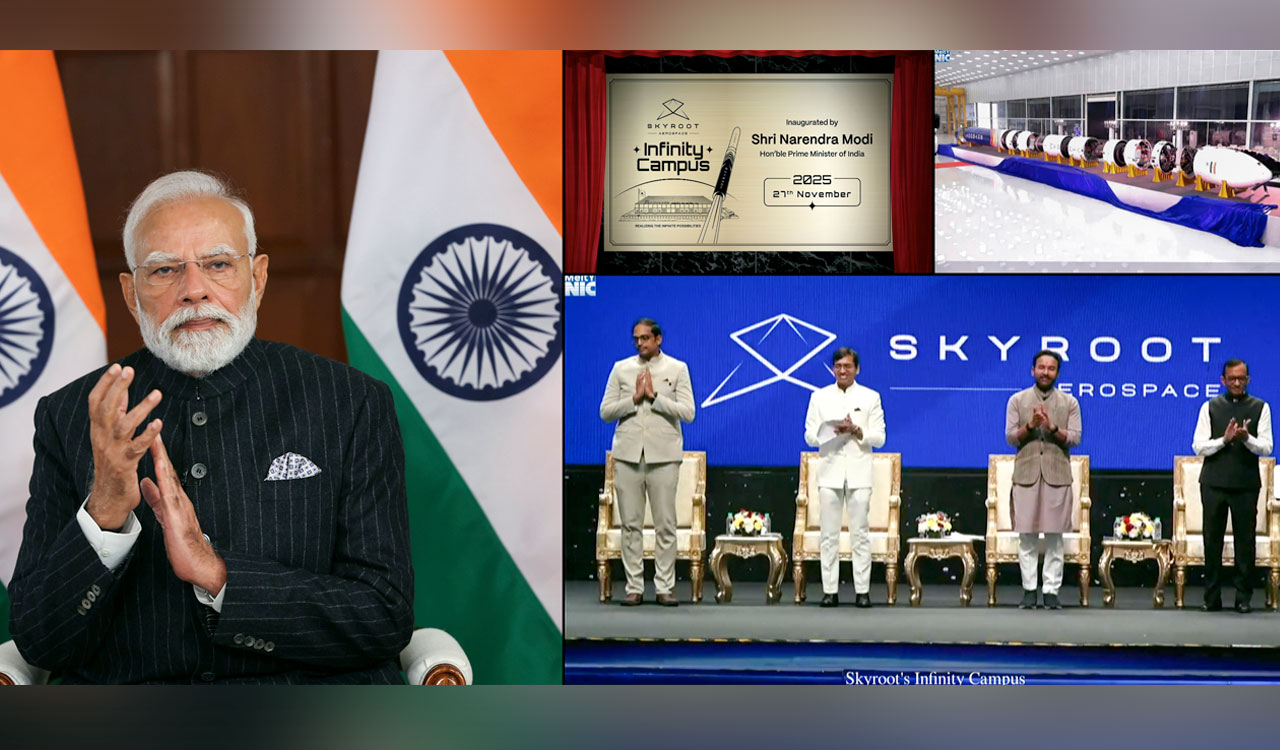PM Modi unveils Skyroot’s Vikram-I rocket, lauds Gen Z for boosting India’s space sector
Prime Minister Narendra Modi on Thursday unveiled Skyroot’s first orbital rocket, Vikram-I, while inaugurating the startup’s Infinity Campus in Hyderabad. He praised Gen Z engineers and credited space sector reforms for the rise of over 300 private space startups in India

Hyderabad: Prime Minister Narendra Modi on Thursday unveiled space startup Skyroot’s first orbital rocket and praised Gen Z professionals for creating new technologies.
The PM virtually inaugurated Skyroot’s Infinity Campus here. The company’s orbital rocket Vikram-I has the capability to launch satellites to orbit. Modi said today, Gen Z engineers, Gen Z designers, Gen Z coders, and Gen Z scientists are creating new technologies.
In his address, the PM highlighted the government’s ‘historic’ space reforms and said that opening up the space sector to private players has resulted in Skyroot and others coming up with such innovations.
The PM said that today in India’s space ecosystem, the private sector was emerging with flying colours. Over 300 space startups were giving new hope to the sector.
“The Infinity Campus is a reflection of India’s new thought, innovation, and the bigger youth power. Youth’s innovation, risk-taking ability, and entrepreneurship are touching new heights,” the PM noted.
“India’s private space talent is making its own identity in the world. Today, India’s space sector is becoming an attractive destination for global investors. Today, the demand for small satellites is increasing rapidly in the world,” Modi said.
He traced the journey of the Indian space programme from its nascent stages– where rocket parts were moved on a bicycle to building the “most trusted launch vehicle.” The journey might have started with limited resources, but the growth proved that determination decides dreams, Modi said.
In these changing times, the space sector is expanding so much, covering the areas of communication, weather prediction, urban planning, and national security, among others.
“So that is why we have made historic reforms in the space sector, opened it up to the private sector, and made a new space policy. Startups and industry were linked with innovation, set up In-Space,” he said.
He further said plans were there to open up the nuclear sector also to private players. Skyroot’s state-of-the-art facility will have around two lakh sq ft. workspace for designing, developing, integrating, and testing multiple launch vehicles, with a capacity to build one orbital rocket every month.
Skyroot is India’s leading private space company, founded by Pawan Chandana and Bharath Dhaka, both IIT alumni and former scientists of ISRO. In November 2022, Skyroot launched its sub-orbital rocket, Vikram-S, becoming the first Indian private company to do so.
The rapid rise of private space enterprises is a testament to the success of the transformative reforms carried out by the NDA government in the last few years, reinforcing India’s leadership as a confident and capable global space power, an official release had earlier said.
In his address, Modi recalled that India’s space journey started with limited resources, but its ambitions were never limited. For decades, ISRO has given new wings to the country’s space journey, he said, and stressed that credibility, capacity, and value have established India’s distinct identity in the sector.
The space agency’s facilities and technologies were made available to the startups, he said, pointing out that India’s space sector has been transformed into an open, cooperative, and innovation-driven ecosystem in the last six-seven years.
He said India’s youth always place national interest above all and make the best use of every opportunity. Modi said when the government opened the space sector, the country’s youth, especially the Gen-Z generation, came forward to take full advantage of it.
“Today, over 300 Indian space startups are giving new hope to India’s space future. Most of these space startups began with small teams, sometimes two people, sometimes five, sometimes in a small rented room with limited resources, but with the determination to reach new heights. I had the opportunity to meet them,” he said, adding that this spirit gave birth to the private space revolution in India.
He also hailed the country’s youth. Be it the propulsion system, composite materials, rocket stages, satellite platforms, India’s youth are working in areas that were unimaginable a few years ago, he said.
India possesses space sector capabilities that only a few countries in the world have, the prime minister said, emphasising that its space capability is both cost-effective and reliable, which is why the world has high expectations from the country.
He remarked that global companies want to manufacture satellites in India, avail launch services, and seek technology partnerships, and stressed that the nation must make the most of this opportunity.
He highlighted that over the past decade, a new wave of startups has emerged across diverse sectors such as FinTech, AgriTech, HealthTech, ClimateTech, EduTech and DefenseTech, with India’s youth, particularly the Gen-Z generation, providing innovative solutions in every field.
Modi further said that more than 10,000 Atal Tinkering Labs have already been set up to instill a spirit of research and innovation among students, and added that work is underway to establish 50,000 new labs in the coming days.
Related News
-
Vaishnaw apologises for chaos at opening day of AI summit
8 mins ago -
Chairperson polls in three municipalities deferred again as Congress unleashes anarchy
26 mins ago -
25th batch of police canines, handlers pass out at IITA Moinabad
2 hours ago -
Kharge slams AI Summit management, alleges global embarrassment
2 hours ago -
PM Modi calls India AI Impact Expo 2026 powerful convergence
3 hours ago -
Writing code will not be main goal in AI era: Infosys Chairman
3 hours ago -
India contributes 16 per cent of world AI talent, white paper reveals
3 hours ago -
Kukatpally family conducts funeral after days of prayers for deceased
3 hours ago




